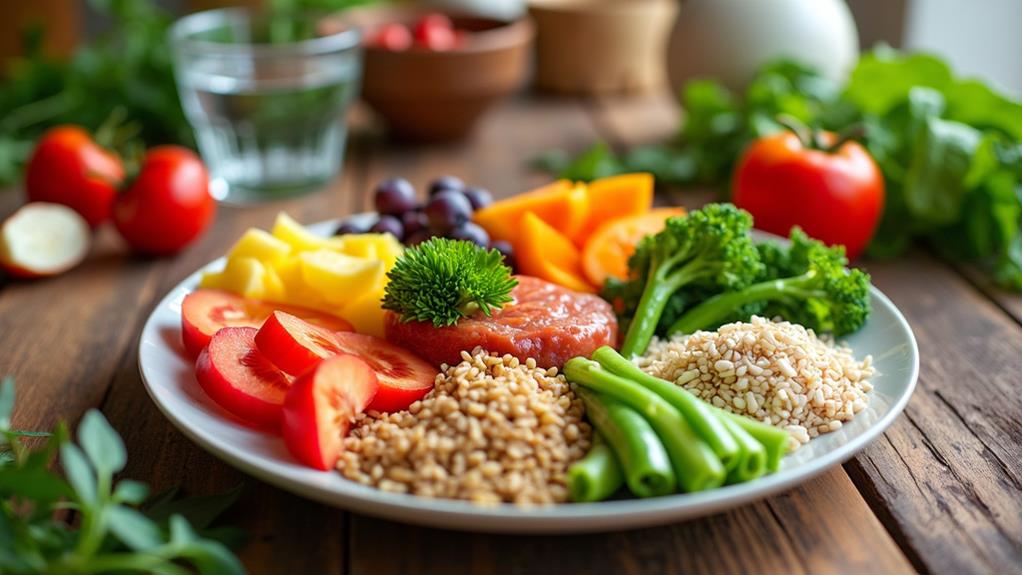You might think of fiber as just something to keep you regular, but it does much more than that. Fiber is essential for heart health, helps manage your weight, and even keeps your blood sugar levels in check. Including a variety of high-fiber foods in your diet can substantially improve your overall well-being. But what types of fiber should you focus on, and how exactly do they benefit your body? Let's explore the different kinds and their specific impacts on your health.
Types of Dietary Fiber
Dietary fiber comes in two main types: soluble and insoluble. Soluble fiber dissolves in water, forming a gel-like substance. You'll find this type in foods like oats, beans, and apples. Its fiber solubility allows it to mix with water, which can help slow down digestion. This slower process aids in better nutrient absorption and can keep you feeling full longer.
Insoluble fiber, on the other hand, doesn't dissolve in water. Think of it as the broom sweeping through your intestines. Foods rich in insoluble fiber include whole grains, nuts, and vegetables like carrots. This type of fiber adds bulk to your stool, making it easier to pass through your digestive system.
Understanding fiber solubility is vital because each type of fiber plays a different role in your diet. Soluble fiber helps with nutrient absorption, while insoluble fiber aids in regular bowel movements. Incorporating both types into your meals guarantees you get a balanced intake, supporting various bodily functions. By including a mix of fiber-rich foods, you'll not only improve digestion but also promote overall health.
Benefits for Digestion
Understanding the different types of dietary fiber sets the stage for appreciating their benefits for digestion. Both soluble and insoluble fibers play vital roles in keeping your digestive system running smoothly. Soluble fiber absorbs water and forms a gel-like substance, which slows down digestion and aids in the absorption of nutrients. Insoluble fiber, on the other hand, adds bulk to your stool and helps move it through the gut, enhancing gut motility.
- Prevents Constipation: Insoluble fiber adds bulk to your stool, making it easier to pass and reducing the chances of constipation.
- Supports Gut Bacteria: Soluble fiber acts as a prebiotic, feeding the beneficial bacteria in your gut, which in turn produces short-chain fatty acids that promote gut health.
- Regulates Bowel Movements: Both types of fiber help normalize bowel movements, reducing the risk of digestive disorders like diverticulitis.
- Improves Nutrient Absorption: By slowing down digestion, soluble fiber allows more time for nutrient absorption, ensuring you get the most out of your food.
Fiber and Heart Health
Often overlooked, fiber plays a crucial role in maintaining heart health. Including enough fiber in your diet can lead to significant cardio risk reduction. Soluble fiber, found in foods like oats, beans, and apples, helps lower your cholesterol levels by binding to cholesterol particles and removing them from your body before they cause harm. This process directly reduces your risk of developing heart disease.
Moreover, fiber contributes to blood pressure regulation. High blood pressure is a major risk factor for heart disease and strokes. By consuming fiber-rich foods, you can help maintain a healthy blood pressure. Fiber helps by improving your body's sensitivity to insulin, which in turn stabilizes blood sugar levels and reduces hypertension.
Additionally, a high-fiber diet promotes overall cardiovascular health by reducing inflammation and improving blood vessel function. When your blood vessels are healthy and inflammation is minimized, your heart doesn't have to work as hard to pump blood throughout your body. This makes a big difference in long-term heart health. A high-fiber diet can also aid in regulating blood sugar levels and lowering cholesterol, both of which are critical factors in maintaining a healthy cardiovascular system. One of the key ways diet fights chronic inflammation is by providing essential nutrients, such as antioxidants and omega-3 fatty acids, which help to counteract oxidative stress in the body. Incorporating fiber-rich foods like fruits, vegetables, whole grains, and legumes into your meals creates a strong foundation for reducing the risk of chronic diseases linked to inflammation.
Weight Management Support
Beyond its benefits for heart health, fiber also plays a pivotal role in weight management. When you increase your fiber intake, it helps you feel full longer, which in turn supports hunger control. This is vital when you're trying to manage or lose weight. Fiber-rich foods slow down the digestion process, making you feel satisfied with fewer calories.
- Increases Satiety: Fiber absorbs water and expands in your stomach, making you feel full for a longer period after meals.
- Reduces Appetite: By promoting a feeling of fullness, fiber can help reduce overall calorie intake.
- Regulates Blood Sugar: Fiber helps stabilize blood sugar levels, preventing the spikes and crashes that can trigger hunger and overeating.
- Promotes Digestive Health: A healthy gut can improve your metabolism and overall digestive efficiency, aiding weight management efforts.
High-Fiber Food Sources
When it comes to boosting your fiber intake, choosing the right foods is essential. Whole foods are your best bet, so aim for fruits, vegetables, whole grains, nuts, and seeds. Apples, pears, and berries are excellent fruit choices, while vegetables like broccoli, carrots, and Brussels sprouts pack a fiber punch. Whole grains such as oats, barley, and brown rice are also great for meeting your daily intake requirements.
Instead of relying solely on fiber supplements, incorporate these high-fiber foods into your meals. For breakfast, consider oatmeal topped with berries and nuts. At lunch, a salad with mixed greens, chickpeas, and quinoa will keep you full and satisfied. For dinner, think about adding a side of roasted vegetables or a serving of lentil soup.
Don't forget snacks! Nuts, seeds, and fresh fruit are convenient, fiber-rich options. While fiber supplements can help if you struggle to meet your daily intake, they shouldn't replace whole food sources. By integrating a variety of high-fiber foods into your diet, you'll naturally boost your fiber intake, aiding digestion and overall health. Remember, consistency is key to reaping the benefits.
At a Glance
Incorporating fiber into your diet is a simple yet powerful way to boost your overall health. You'll benefit from better digestion, a healthier heart, and more effective weight management. By choosing high-fiber foods like fruits, vegetables, whole grains, and legumes, you're making a positive impact on your well-being. Don't underestimate the power of fiber in your daily meals; it's a key ingredient for a healthier, happier you.





